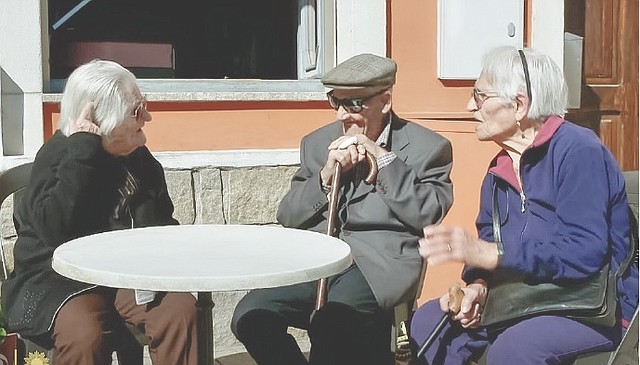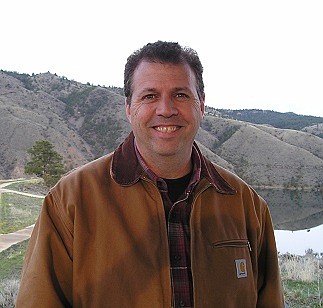Living to 100
One island’s remarkable record of centenarians
March 30, 2022 at 4:09 p.m. | Updated March 30, 2022 at 4:09 p.m.
Old age is common and celebrated in this town, where murals depict residents who’ve reached at least 100. Photos courtesy CBS News
“Old age is common and celebrated in this town, where murals depict residents who’ve reached at least 100,” reports CBS news correspondent, Seth Doane.
The town of Villagrande, with its beaches and beauty, is a mecca for tourists. But, says Doane, it also draws scientists and gerontologists, including Gianni Pes and Valter Longo, who directs the Longevity Institute at the University of Southern California.
“The whole world talks about this town,” Longo said. He points to the percentage of those reaching 100 in the villages of Sardinia as being “extremely rare anywhere in the world.” Villegrande is just one centenarian-rich town in Sardinia.
Italy has one of the highest life expectancies in the world, but Sardinia beats their record. Consider that there are 33.6 people 100 or older for every 100,000 Sardinian residents.
Scientists note that genetics undoubtedly play a role in the long lives of these island dwellers. No one is a hurry in this slow-paced lifestyle. At the same time, an active, community-based lifestyle and a healthy diet are key factors. Daily walking is their exercise where everyone strolls up and down the hillsides. Most continue to grow their own vegetables even as they themselves grow into old age. The diet focuses on vegetables and herbs. A little protein—usually fish, plus extra virgin olive oil, local yogurt, cheese and traditional flat bread round out the diet. Plus a leisurely glass of red wine enjoyed with others.
People help each other out, and seniors remain central to family life. “In town, community and family is important, particularly for Marietta Monni, who lives alone at 100,” reports Doane. He joined her for lunch, made by her family who live upstairs.
“Nearby, at Giulia Pisanu’s house, we asked this centenarian what she thought the secret to a long life might be.” Don’t be envious, she replied. “Advice that may not be scientific, but like those celebrated on the walls here, it comes from the perspective and wisdom of age,” concludes Doane.
You can watch the program at
A recent study by the Global Burden of Disease published in PLOS Medicine confirmed the essential role that diet plays in longevity. It concluded that an optimized diet focusing on legumes, which includes beans, peas and lentils, plus whole grains, vegetables and fruits (especially berries), and nuts are crucial elements of an optimized diet. Fiber, omega-3 fatty acids and probiotics are important elements of gut health, your center of immunity. This optimized diet can add up to 13 years to your life, reported the study. The younger you start, the better off you are, but starting diet at age 60 can lengthen your life by up to nine years. Even those age 80 or old
Dr. David Katz, a researcher on how food can be used as preventive medicine, concludes: An improved diet means less chronic disease, and therefore a longer life. “Reducing red and processed meats – processed foods of all kinds – is one way to improve a diet quickly.”
The Helfgott Research Institute published a study in Impact Journals demonstrating that participants who practiced the study’s prescribed movement (exercise), relaxation (stress reduction) and a mindful diet for two months reversed their biological age by three years!
MORE LONGEVITY NEWS
Who You Calling Old?
…by John Schieszer
Such extreme longevity, according to researchers at the University of Washington, will likely continue to rise by the end of this century.
The researchers, who published their findings in the journal Demographic Research, used statistical modeling to examine the extremes of human life. With ongoing research into aging, the prospects of future medical and scientific discoveries, and the relatively small number of people to have verifiably reached age 110 or older, experts debate limits to the maximum age possible.
While many of us know our health affects longevity and quality of life, millions of Americans struggle to do even the small things that will help them live younger longer, according to Dr. Stephen Kopecky, who is a preventive cardiologist at Mayo Clinic. He has written a book entitled, Live Younger Longer: 6 Steps to Prevent Heart Disease, Cancer, Alzheimer’s and More.
Dr. Kopecky said there will always be risk factors we can’t change, such as genetics, sex, age or a global pandemic. “But we can control others, such as what we put in our bodies and how much exercise and sleep we get. Prevention should be the cornerstone of medicine because it helps to prepare for the unexpected.”
Eating lots of fruits and vegetables provides antioxidants and anti-inflammatory nutrients that help the immune system fight infections. Dr. Kopecky, who is a two-time cancer survivor, recommends fruits, vegetables and healthy fats from olive oil and nuts, all found in the Mediterranean diet. These foods serve up antioxidants and anti-inflammatory nutrients, such as beta carotene, vitamin C, vitamin E and polyphenols, and promote healthy immune responses. Polyphenols are plant-based micronutrients that control how the immune
What people eat also helps beneficial bacteria in the gut communicate with the immune system and the lungs, allowing for a more effective response to foreign invaders, such as respiratory viruses. Any disruption to this delicate balance of bacteria, like an unhealthy diet or medication such as an antibiotic, can make people more susceptible to infections and complications.
In addition to a healthy diet, keep these longevity tips in mind:
Exercise: Exercise has been shown to give the immune system a boost. “Moderate exercise, where you can talk but not sing while exercising, is enough to increase the activity of virus-killing cells both in the short-term and long-term. Even 20 minutes daily can help quell inflammation and boost immunity, and exercise can be divided up during the day,” Dr. Kopecky said. “The best part about exercise is that it can be done anywhere. Leg lunges, sit-ups, squats and stair-climbing are all easy exercises you can do at home.”
Relaxation: Calming activities and supportive relationships minimize stress, reduce cortisol production and enhance the immune system’s function. Practicing mindfulness and stepping away from what’s causing anxiety can help a person stay grounded. Exercises that have calming or meditative qualities, such as yoga, are beneficial. Try practicing gratitude by being thankful for three things when going to sleep at night or waking up in the morning. Dr. Kopecky said this simple habit lowers stress.
Sleep Matters. Adequate sleep boosts the immune cells circulating in your body. The interaction between immune system and sleep is a two-way street. “When you’re not sleeping well, you may notice that you get sick more easily,” said Dr. Kopecky. He suggests cultivating the habit of putting down the cellphone at least a couple of hours before bedtime. The blue light suppresses melatonin, which helps people get a good night’s sleep.
John Schieszer is an award-winning national journalist and radio and podcast broadcaster of The Medical Minute. He can be reached at medicalminutes@gmail.com







